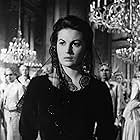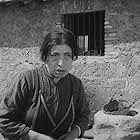Two young hunters of wolves are involved in a conflict. Besides the dangerous wild wolves, beautiful Teresa is the center of attention.Two young hunters of wolves are involved in a conflict. Besides the dangerous wild wolves, beautiful Teresa is the center of attention.Two young hunters of wolves are involved in a conflict. Besides the dangerous wild wolves, beautiful Teresa is the center of attention.
- Awards
- 1 nomination
Storyline
Featured review
Giuseppe de Santis made a stunning directorial debut with 'Caccia Tragica' in 1947 and went one better two years later with 'Riso Amaro', indisputably a classic of World Cinema. This iconic film would prove a tough act to follow!
The 1950's saw an audience shift away from neo-realism and de Santis was obliged to adapt his style with variable results.
The unevenness of 'Uomini e Lupi' is not altogether de Santis' fault and it is a great pity that he lost control of the editing to the Producer and disowned the whole enterprise. Neither is the film helped by being conceived on too grand a scale. As envisaged by writers Tonino Guerra and Elio Petri this is a simple tale of Man against Nature but its Cinemascope format renders everything and everyone rather remote and robs the piece of the intimacy that is De Santis' forte.
On paper the cast is top notch but somehow fails to gel. Silvana Mangano is the obvious choice to play Teresa and she is as statuesque and enigmatic as ever but here alas she is a little too much of both and although things pick up a bit as her relationship with the Ricuccio of Yves Montand develops there is an absence of 'chemistry' between the two. Monsieur Montand captures the free spirit of the character but seems curiously removed and one cannot help thinking that Raf Vallone would have been more convincing. The role of Teresa's husband Giovanni is pretty dreary and even the excellent Pedro Armandariz cannot rise above it. There is a full-blooded performance by Irene Cafaro as the mayor's daughter who sets her sights on Ricuccio. This actress, like so many of her contemporaries, came to film via beauty pageants but alas gave it all up before realising her true potential.
Granted, there are some splendid images here especially of the heavy snow falls in the Abruzzo region and the final battle with the wolves is impressively handled whilst Mario Nascimbene contributes a marvellous score. One is left however with a feeling of regret at what might have been.
De Santis' last feature of note came in 1964 and it is gratifying to know that his death in Rome in 1997 was marked as a national day of mourning.
The 1950's saw an audience shift away from neo-realism and de Santis was obliged to adapt his style with variable results.
The unevenness of 'Uomini e Lupi' is not altogether de Santis' fault and it is a great pity that he lost control of the editing to the Producer and disowned the whole enterprise. Neither is the film helped by being conceived on too grand a scale. As envisaged by writers Tonino Guerra and Elio Petri this is a simple tale of Man against Nature but its Cinemascope format renders everything and everyone rather remote and robs the piece of the intimacy that is De Santis' forte.
On paper the cast is top notch but somehow fails to gel. Silvana Mangano is the obvious choice to play Teresa and she is as statuesque and enigmatic as ever but here alas she is a little too much of both and although things pick up a bit as her relationship with the Ricuccio of Yves Montand develops there is an absence of 'chemistry' between the two. Monsieur Montand captures the free spirit of the character but seems curiously removed and one cannot help thinking that Raf Vallone would have been more convincing. The role of Teresa's husband Giovanni is pretty dreary and even the excellent Pedro Armandariz cannot rise above it. There is a full-blooded performance by Irene Cafaro as the mayor's daughter who sets her sights on Ricuccio. This actress, like so many of her contemporaries, came to film via beauty pageants but alas gave it all up before realising her true potential.
Granted, there are some splendid images here especially of the heavy snow falls in the Abruzzo region and the final battle with the wolves is impressively handled whilst Mario Nascimbene contributes a marvellous score. One is left however with a feeling of regret at what might have been.
De Santis' last feature of note came in 1964 and it is gratifying to know that his death in Rome in 1997 was marked as a national day of mourning.
- brogmiller
- Aug 5, 2021
- Permalink
Details
- Runtime1 hour 34 minutes
- Sound mix
- Aspect ratio
- 2.35 : 1
Contribute to this page
Suggest an edit or add missing content














